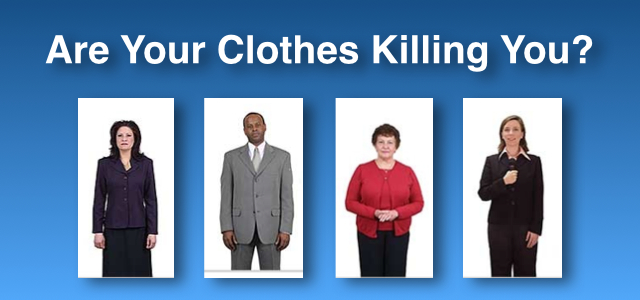
“Over the past 10 years, I’ve found that when I wear jeans and a comfortable shirt I’m more relaxed, comfortable, and active during the day. When I’m wearing dress pants, a dress shirt, and nice shoes (business casual apparel) I choose to take the bus or drive to avoid sweating in those clothes or risking that they get dirty. I firmly believe that our clothes can influence our wellness and healthy choices throughout the day.” ~ Gregory Johnson, Director of the Health Resource Group
Clothing Impact on Mindset
According to a recent study by Hajo Adam and Adam Galinsky of Northwestern University, your clothing can influence your mental state. From their research, it was discovered that simply “wearing a lab coat increased selective attention compared to not wearing a lab coat.” According to a preliminary test, their research found that “a lab coat is generally associated with attentiveness and carefulness.”
Clothing Impact on Stress
The Lululemon.com manifesto states, among other things, that “Stress is related to 99% of all illness.” It’s their goal to bring people to a place of comfort, relaxation, and wellness through clothing — and in doing so, to bring health to the world.
Clothing Impact on Activity Level
The American Council on Exercise issued a report in 2004 that confirms the above findings: “ACE Study Finds Fitness Benefits of Wearing Casual Clothing to Work Casual And Comfortable Clothing Workdays Promote Increased Physical Activity.” The report is summarized below.
SAN DIEGO, Calif. – July 12, 2004 – Does wearing casual clothing to the workplace affect the physical activity levels of workers? Yes it does. The American Council on Exercise (ACE), America’s non-profit fitness advocate, today announced results of a new ACE-commissioned study of how wearing casual clothing vs. wearing conventional business attire affects physical activity levels in our daily routines.
The study, lead by researchers Katie Zahour, M.A., and John Porcari, Ph.D., both from the University of Wisconsin, La Crosse, examined 53 healthy men and women (average age: 42). Each study participant wore a pedometer two days a week (one day dressed in normal work attire; the other dressed in jeans) for two weeks.
Researchers found that workday physical activity levels increased when casual clothing was worn. Specifically, study participants took an average of 491 (or 8 percent) more steps on Jeans Day than on those days in which they wore normal business attire. That works out to an average of 2.85 miles walked on Jeans Day versus 2.64 miles walked on the normal business attire days. It is also estimated that study participants burned an average of 25 additional calories on Jeans Day with the extra steps and miles walked.
Wearing casual clothing every day for 50 weeks of work translates into burning an additional 125 calories per week and 6,250 calories per year. Considering you must burn 3,500 calories to lose one pound, the added activity from casual clothing workdays could potentially offset the average annual weight gain (i.e., 0.4 to 1.8 pounds) experienced by Americans adults.
“Over the last 25 years, advances in technology combined with our hectic lifestyles have help to virtually eliminate physical activity from our daily routines,” says Cedric X. Bryant, Ph.D., chief exercise physiologist for ACE. “Wearing casual, comfortable clothes to work may be an easy way to encourage us to put physical activity back into our daily lives.”
The full study results appear in the July/August 2004 issue of ACE Fitness Matters magazine.
About ACE
The American Council on Exercise (ACE), America’s Authority on Fitness, is a non-profit organization dedicated to promoting the benefits of physical activity and protecting consumers against unsafe and ineffective fitness products and instruction. As the nation’s “workout watchdog,” ACE sponsors university-based exercise science research and testing that targets fitness products and trends. ACE sets standards for fitness professionals and is the world’s largest nonprofit fitness certifying organization. For more information on ACE and its programs, call (800) 825-3636 or log onto the ACE Web site at www.acefitness.org.
